This article explains what OGG is and gives you some reasons to convert OGG to text. In addition, it introduces 3 tools that can accurately convert audio to text, including MiniTool Video Converter. This article also provides practical methods for reusing the text.
What Is OGG?
OGG is a free and open-source multimedia container format. This format is used to store media files such as audio, video, text, and metadata (like track and artist information). It uses Vorbis to compress audio data, which reduces file size while maintaining high quality. Therefore, it is well-suited for transmitting audio over the internet.
The OGG format can be played almost anywhere. It is supported by many modern devices, desktop operating systems, mobile platforms, and mainstream applications:
- Systems: Windows, macOS, Linux, iOS, Android, and more.
- Media Players: VLC Media Player, GOM Player, 5KPlayer, Foobar2000, and more.
- Web Browsers: Chrome, Firefox, Edge, Opera, and more.
- Online Services: Spotify, Google Drive, and more.
In short, the OGG format can be played perfectly on almost any device. If you have OGG files, have you ever thought about converting them to text? Converting audio to text has several advantages, which I will discuss in the next section.
Why Convert OGG Audio to Text?
Audio content often requires listeners to spend an amount of time to grasp all the information. Converting audio to text helps listeners understand the content more quickly. Furthermore, the transcribed text allows people with hearing impairments to access information quickly as well.
Additionally, if the OGG audio file is a recording of a meeting, the transcribed text can be used to create meeting minutes. Even if the original audio is accidentally deleted or becomes corrupted, the text will remain safe and secure.
How to Transcribe an OGG Audio to Text?
Now that you understand the advantages of converting audio to text, let’s explore how to transcribe audio effectively. Manual transcription is the most accurate method, but it can be time-consuming and costly.
A faster and more efficient alternative is automated transcription using specialized software. If you’re unsure how to choose the right transcription tool, consider the following factors.
How to Choose the Right Transcription Tool
A reliable transcription tool allows you to transcribe OGG files effortlessly. Which features are essential in a reliable transcription tool? Consider the following aspects.
1. Accuracy and Transcription Speed
When choosing a transcription tool, accuracy is your top priority. Selecting a highly accurate audio-to-text converter can significantly reduce the need for subsequent proofreading and editing, saving you valuable time. Additionally, the speed of transcription is also crucial. Faster transcription can improve work efficiency, allowing you to transcribe more audio in less time.
2. Multiple Language Support
Make sure your audio-to-text converter can recognize multiple languages. A good transcription tool not only supports multiple languages but also recognizes different dialects and accents. If the transcription tool cannot recognize the language in the audio, it may transcribe incorrect text.
3. Data Security and Privacy
The audio you need to transcribe may contain personal information, business information, etc. Transcription tools with strong security and privacy measures can ensure that your information is not leaked.
4. Industry-Specific Knowledge
If your audio is full of industry-specific terms, you should choose a transcription tool that supports multiple domains. Otherwise, it may transcribe terms into different words, which could make the whole transcript difficult to understand or convey completely different meanings.
5. User-Friendly Interface
The user-friendly interface of the audio-to-text converter makes it easier to use. Consistent navigation and an intuitive layout allow you to easily complete the transcription process, rather than spending time learning how to use the tool.
Which software or online tools should you try? After hands-on testing, I find 3 tools can convert audio to text quickly and accurately: MiniTool Video Converter, UniScribe, and Sonix. Below, I will detail the advantages of each application and guide you on how to use them.
3 Best Tools for OGG to Text Conversion
Which video compressor is suitable for transcribing OGG files? Here are 3 choices: MiniTool Video Converter, UniScribe, and Sonix.
Option 1: MiniTool Video Converter
How to convert OGG to text? MiniTool Video Converter is a must-try! This software is a multi-functional video processing tool designed specifically for Windows users. It supports converting audio or video to text and can also generate subtitles for your videos.
MiniTool Video Converter offers three modes: Basic Model, Standard Model, and Advanced Model. Different models are suitable for different scenarios, such as note-taking, video editing, and more. You can choose the most suitable mode according to your needs.
Furthermore, MiniTool Video Converter supports multiple languages. It can accurately recognize and extract speech from audio and convert it into editable text. You can export the subtitle in SRT and TXT formats. MiniTool Video Converter is 100 % ad-free, bundle-free, and watermark-free.
How to use this application to convert OGG to text? Here’s a guide:
Step 1: Download and Install MiniTool Video Converter
Hit the download button below and install MiniTool Video Converter on your computer.
MiniTool Video ConverterClick to Download100%Clean & Safe
Step 2: Choose an AI Model
Open the program, click Intelligent Subtitle in the left-hand menu, then click Choose Video. In the pop-up, select the AI model that best matches your needs and confirm with OK.
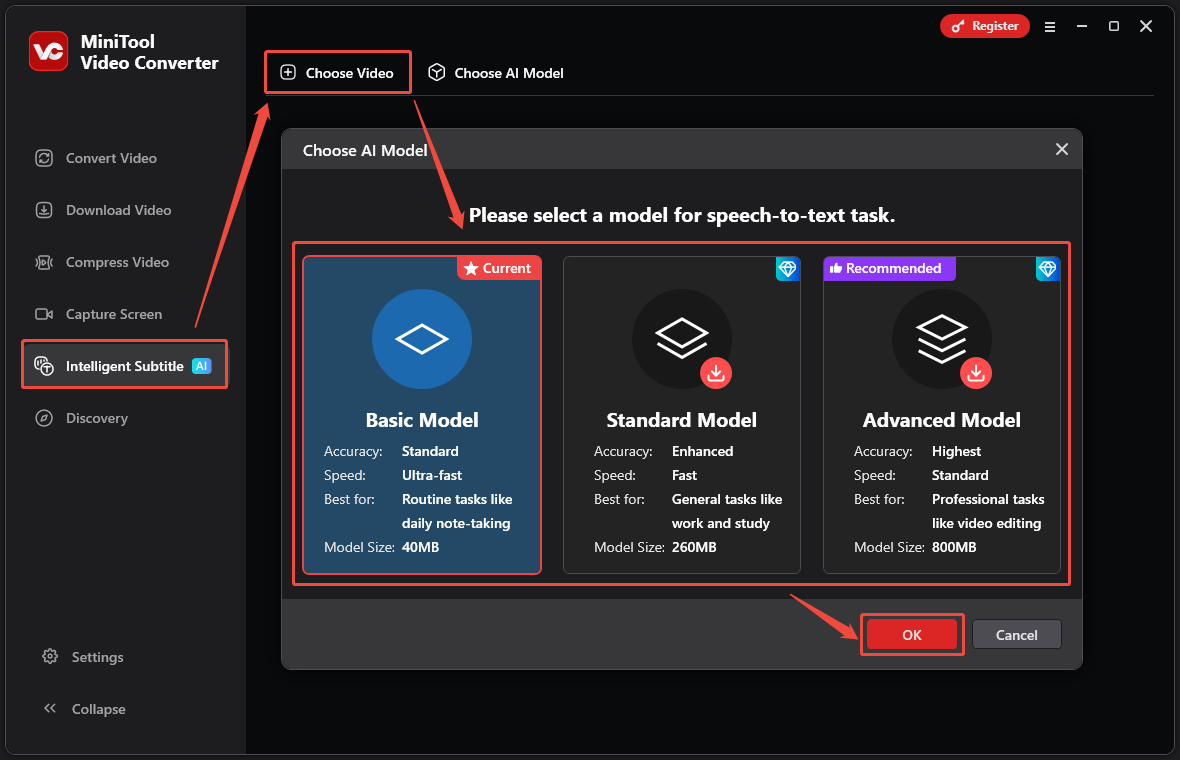
Step 3: Upload Your OGG File
Once you confirm the AI model, the Import Media window appears. Select the OGG file you want to transcribe and click Open to load it into the workspace.
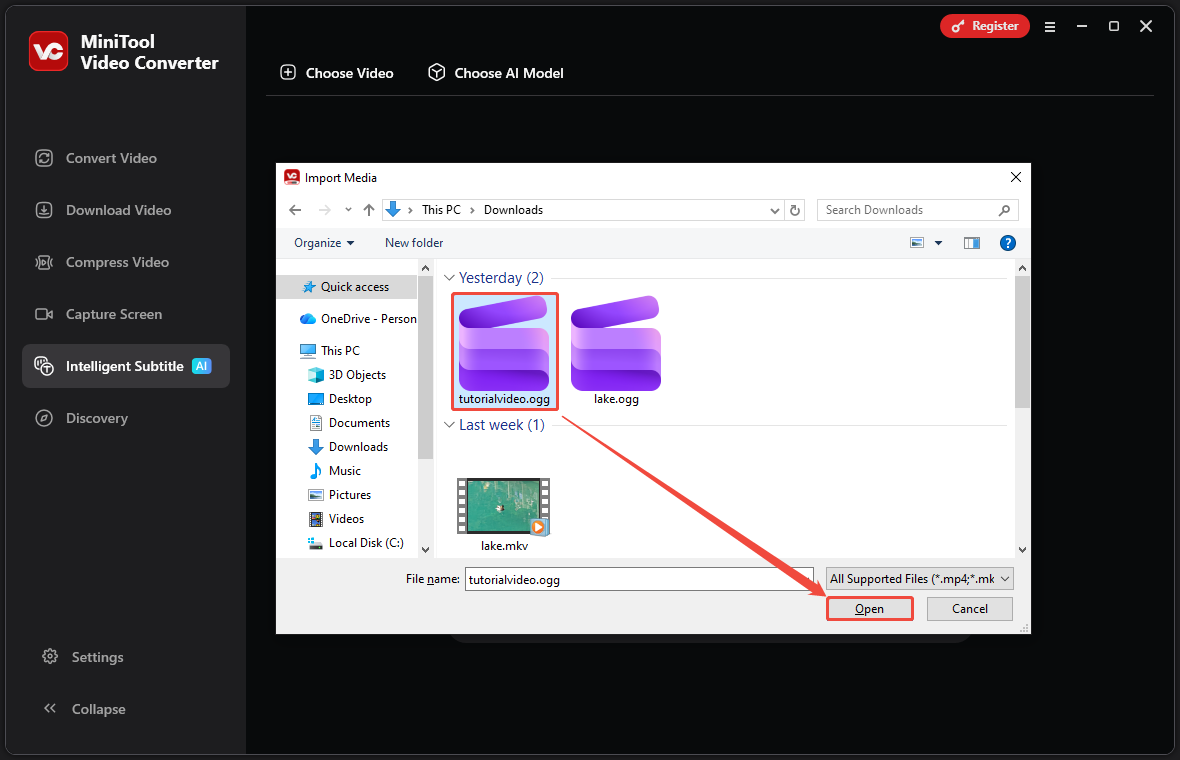
Step 4: Modify the Generated Text
Within seconds, you’ll see the spoken words appear in the right-hand panel. Click the edit button next to any line to modify the text if necessary.
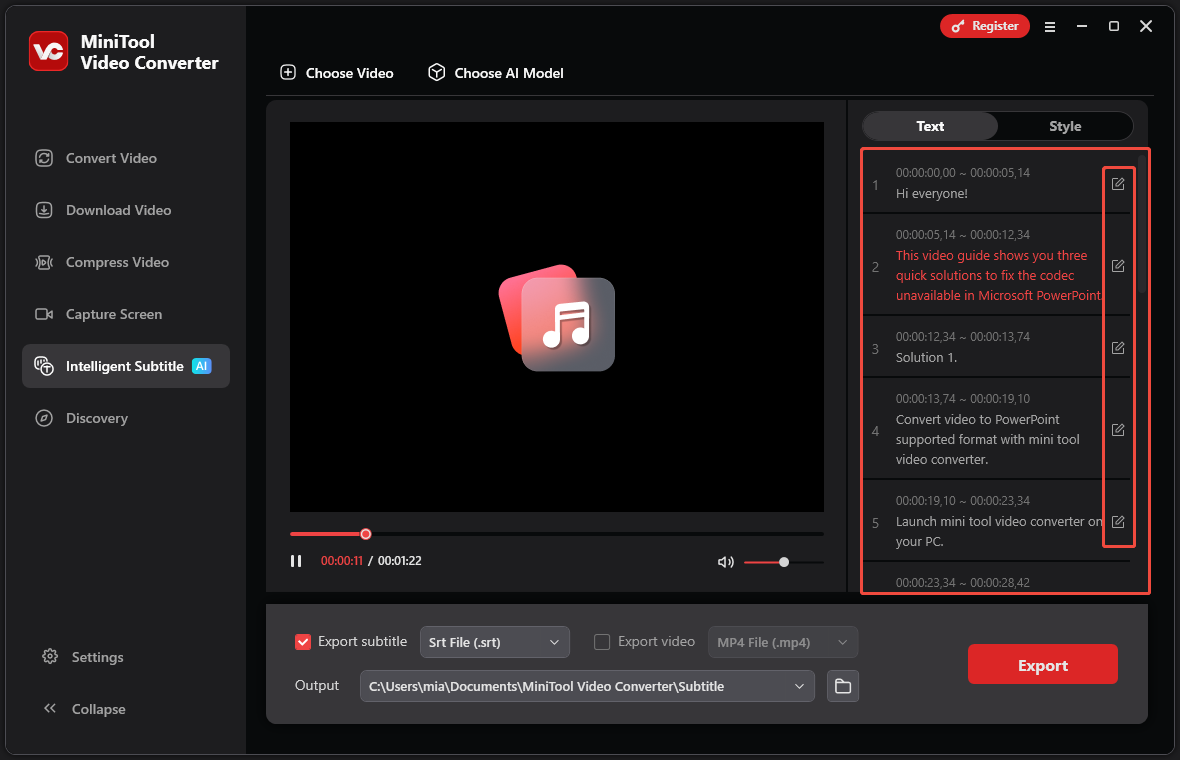
Step 5: Choose Output Text Format
Expand the Export subtitle option and select the output text format.
Step 6: Set the Save Location
Open the Output menu and select the folder you want the transcript saved in.
Step 7: Export the Text File and Check It
Click the Export button in the lower-right corner. When the process completes, the folder will open on its own. Just double-click the new file to view your transcript.
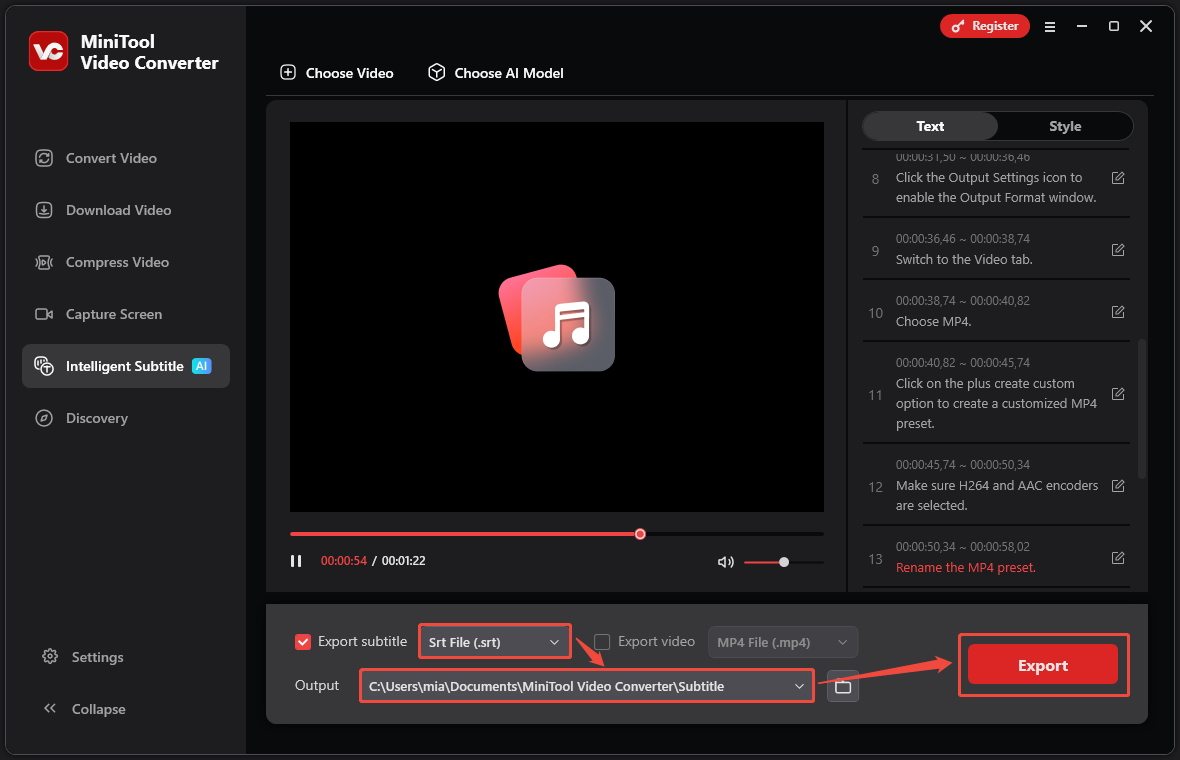
MiniTool Video Converter offers multiple export text formats and allows text editing. Most importantly, its transcription speed is incredibly fast. Its other functions, such as video conversion and video compression, are just as excellent as the Intelligent Subtitle feature! If you don’t want to download any software, you can also use some online OGG-to-text converters, such as UniScribe and Sonix.
Option 2: UniScribe
UniScribe is an AI-powered transcription service that converts audio and video files into text. It supports multiple formats, including OGG, AAC, AMR, FLAC, M4A, WebM, MKV, MOV, MP4, and more. Beyond transcription, UniScribe can also generate audio content summaries after transcription. Furthermore, you can convert the transcribed text into mind maps with one click.
UniScribe also supports exporting to various common text formats such as TXT, SRT, and VTT to meet users’ different needs. It’s important to note that UniScribe offers both a free and a paid version. The free version supports transcribing a total of 120 minutes of audio or video. Once the free trial is used up, you will need to upgrade to the paid version.
Here is a guide on how to transcribe OGG files with UniScribe:
Step 1: Visit the UniScribe Website
Go to https://www.uniscribe.co/l/ogg-to-text.
Step 2: Upload OGG File
Click the Upload File button. Then, in the pop-up window, select the OGG file and click Open to import it to UniScribe.
Step 3: Choose Audio Language
Click the Original Language option and select a language from the drop-down menu.
Step 4: Generate Subtitle
Turn the Generate Subtitle switch to allow the creation of SRT or VTT caption files.
Step 5: Start Transcribing
Click Transcribe for Free to begin the transcription process.
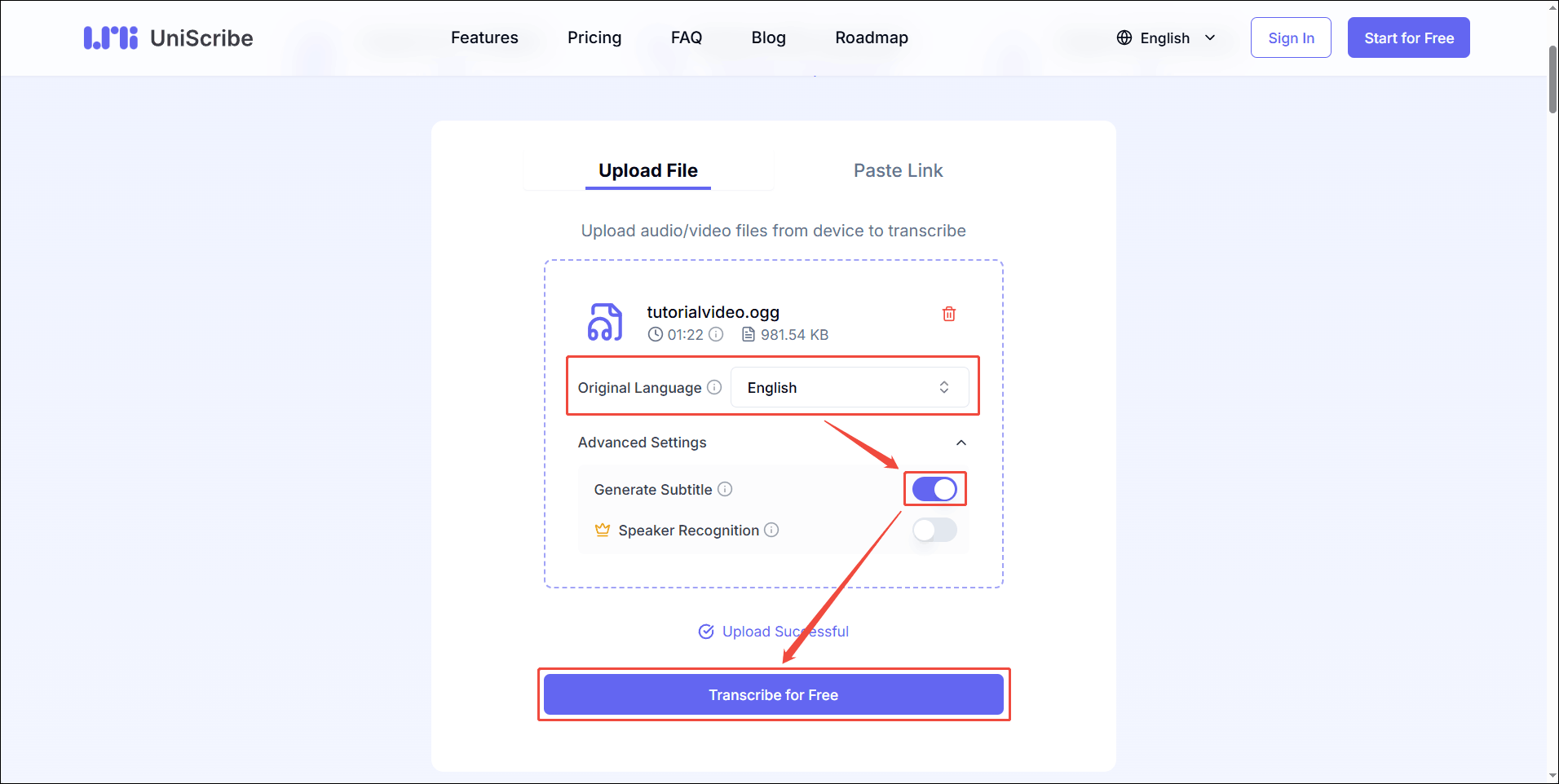
Step 6: Download the Transcripts
Click the Export Transcript button in the upper-right corner to get the transcripts.
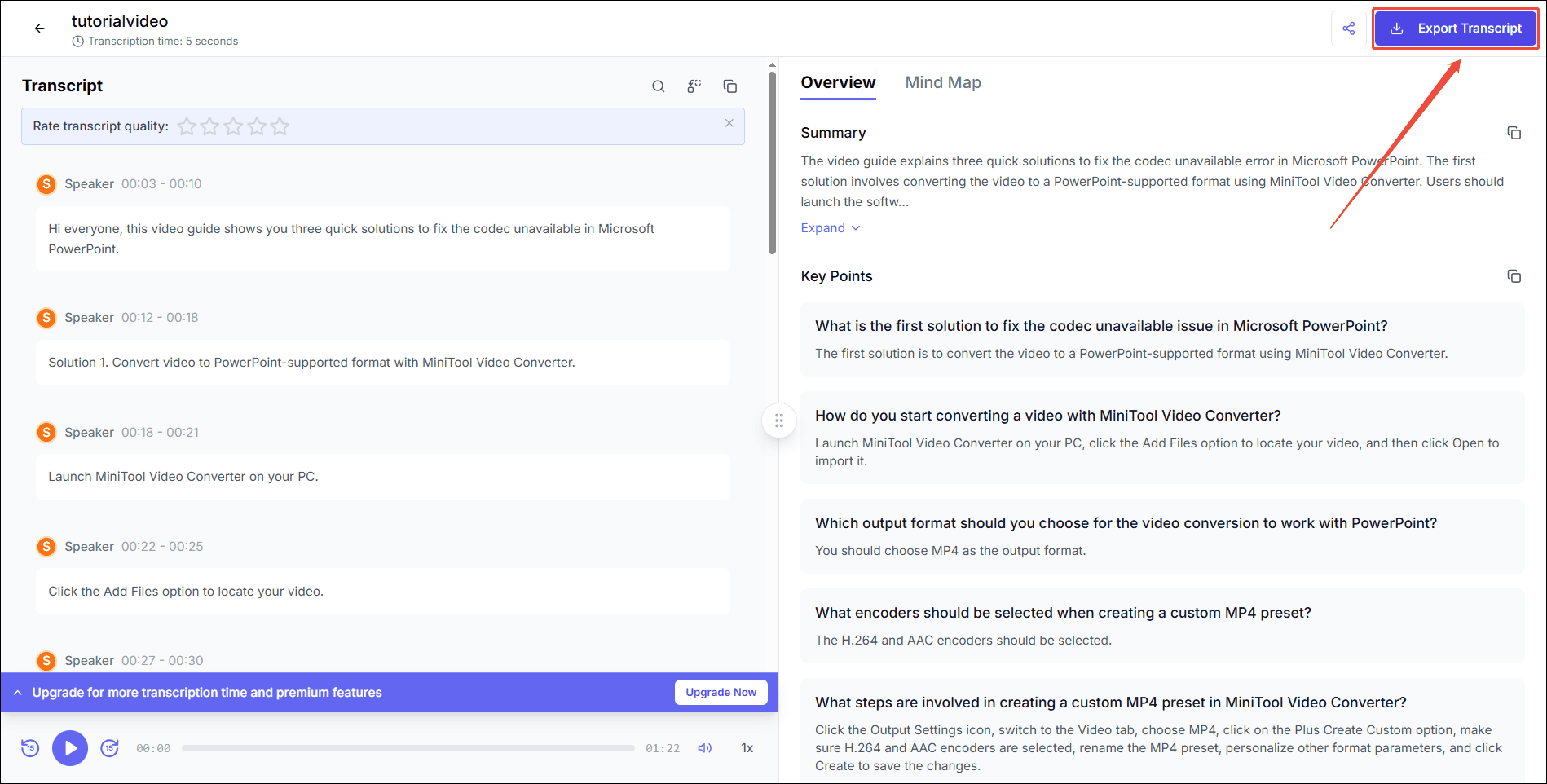
UniScribe’s transcription accuracy is indeed quite good. Furthermore, it can export to various common text formats, such as VTT, SRT, and TXT. However, if you use UniScribe’s free plan, you only have 120 minutes of transcription time per month, and you can only transcribe a maximum of 3 files per day.
Option 3: Sonix
How to accurately convert OGG to text online? Sonix is a good choice. It’s an online audio-to-text converter that supports transcribing audio with up to 99% accuracy. Sonix supports a variety of popular audio and video formats, including OGG, MP3, M4A, MP4, MOV, and more.
Furthermore, Sonxi supports over 50 languages. It allows each new user to enjoy 30 minutes of free automatic transcription. If you need to transcribe more content, you must purchase a paid Sonix subscription.
Here are simple instructions for converting an OGG file to text with Sonix:
Step 1: Visit the Sonix Website
Navigate to https://my.sonix.ai/ and sign in to your Google account.
Step 2: Upload Your File
In the dashed box, click Select from computer, choose the OGG audio, and click Open.
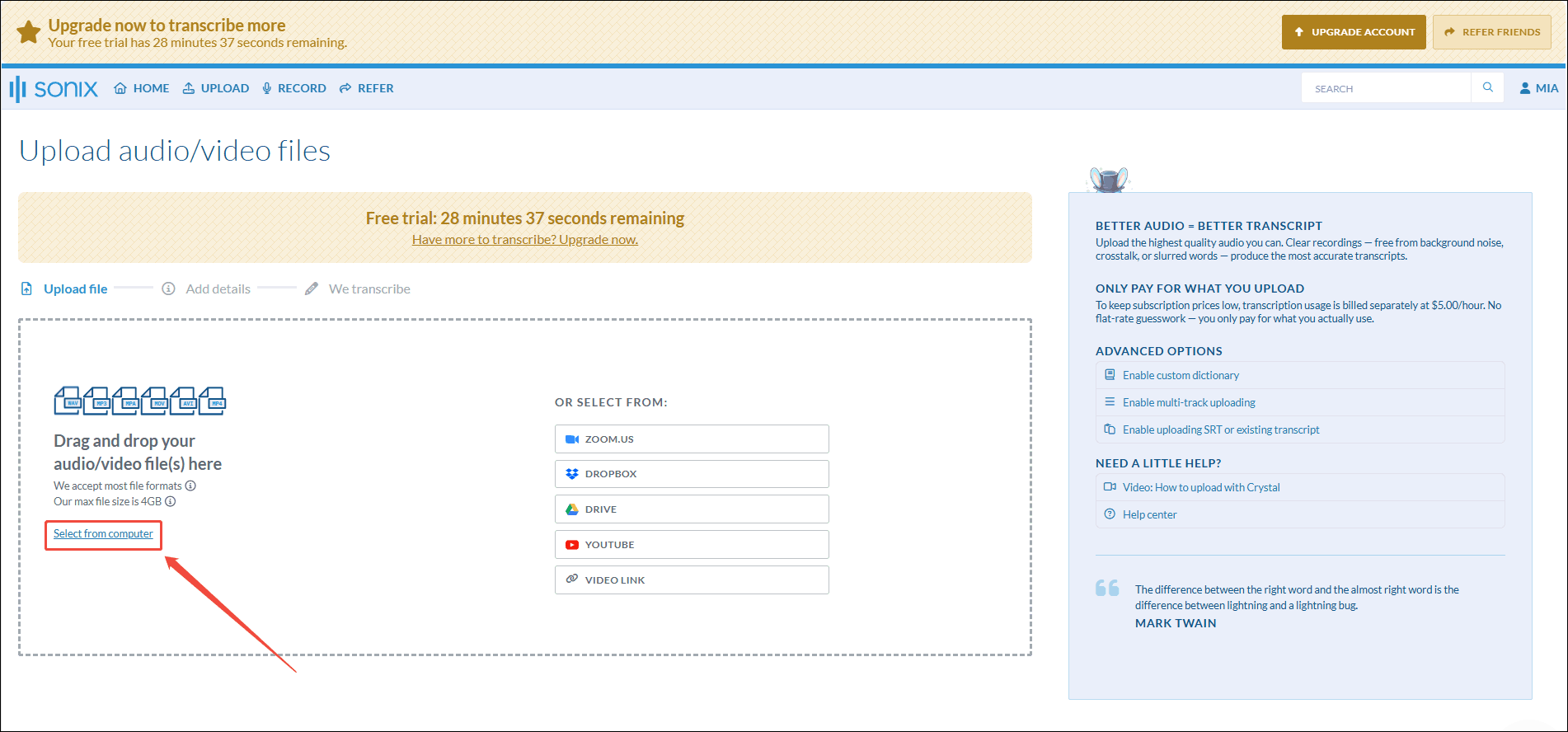
Step 3: Select the Audio Language
Find the What language was spoken section and select the language from the audio below. Here, I select English. Then, click the TRANSCIBR IN ENGLISH button.
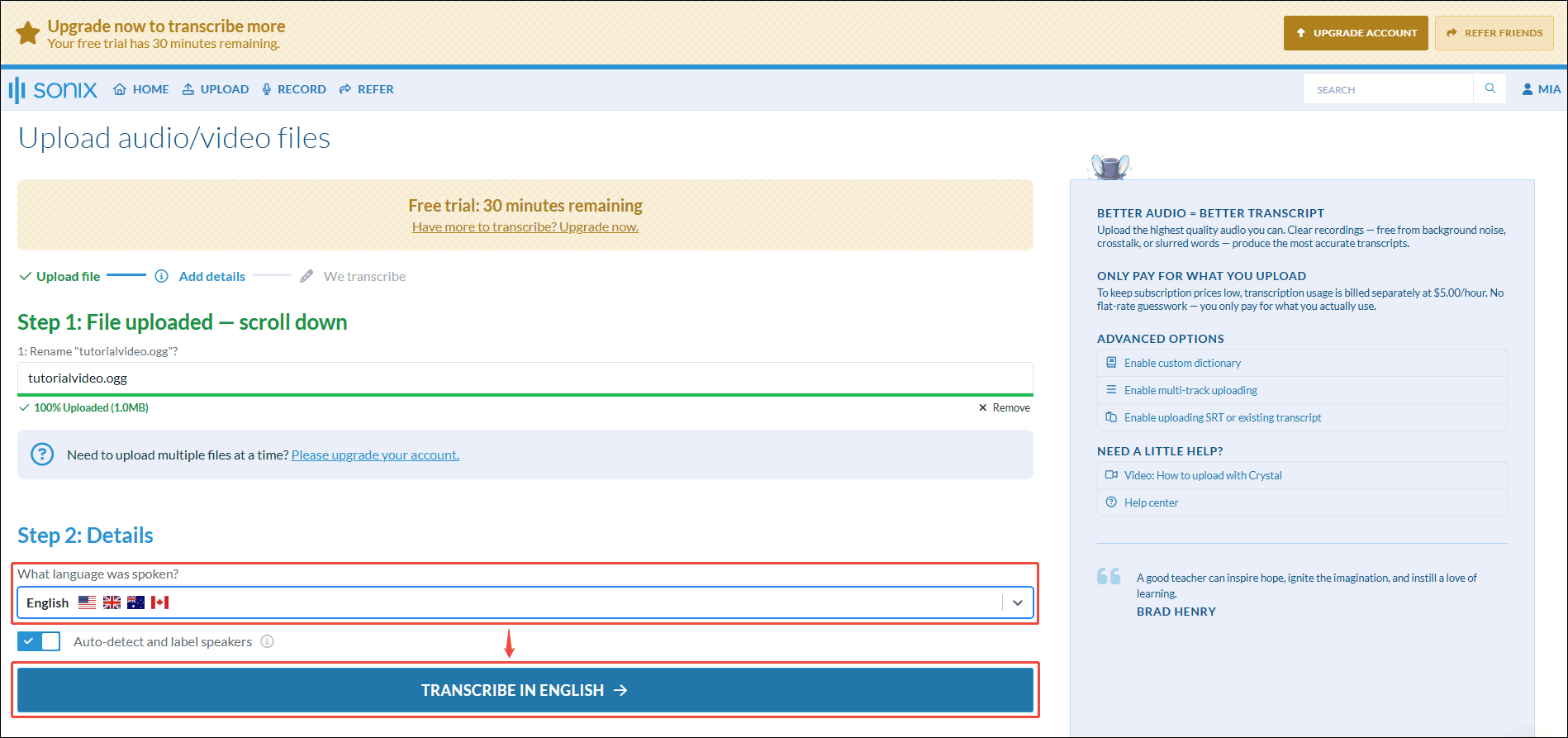
Step 4: Download the Transcript
Click the Export all transcripts in “Home” option. Then, choose an export format in the pop-up window and click EXPORT to download the transcript.
While Sonix and UniScribe are both online transcription tools, Sonix’s transcription speed is slower. However, Sonix supports a wider range of export formats. If you need to transcribe your OGG audio into rare text formats such as TTML or CSV, Sonix is the better choice.
What Can You Do After Converting OGG to Text?
Text is far easier to edit and reuse than audio. Once you convert OGG audio to text, you can use the text for a variety of purposes. Here are some common uses.
1. Translate Text into Other Languages
After transcribing audio into text, you can use translators to translate the text into other languages. For example, if your audio is learning material or an audiobook, you can try translating the transcribed text into other languages so that people from different language backgrounds can understand the content and obtain the information.
Additionally, if you are a language learner, I highly recommend translating the transcribed text into your target language. This can help you better understand the subtle differences between your native language and the target language, improving your language skills.
2. Convert Text into Study Notes
Audio converted to text is easier to edit. Using the transcribed text for note-taking helps deepen understanding, enhance memory, and improve review efficiency.
You can copy and paste the transcribed text into OneNote, Google Docs, or Word Documents. Then, try to reformat the text, delete unimportant information, add your own insights, etc. This way, you can easily create a set of study notes. Taking notes directly on the transcribed text is much more efficient than simply listening to the audio to take notes.
3. Republish Text on Your Blog or Website
Some readers prefer reading to listening to audio. Transcription of OGG audio into clear text gives you reusable resources. For example, transcribed texts can be easily edited and published as blog posts on text-sharing platforms like Blogger and Medium. Some transcribed texts may also include tweets or quotes suitable for platforms like Twitter, LinkedIn, and Instagram.
Conclusion
Transcribing audio to text makes your audio easy to read, search, and share. The transcripts are perfect for translations, making study notes, or turning to a blog post.
In this article, we learned how to convert OGG to text with 3 transcription tools: MiniTool Video Converter, UniScribe, and Sonix. Choose the former if you prefer watermark-free conversion and no file size limits, or if you need batch conversion. For a quick online alternative, the latter two tools work well.
If you have encountered any problems when using MiniTool Video Converter, please contact us via [email protected], and we’ll get back to you fast.


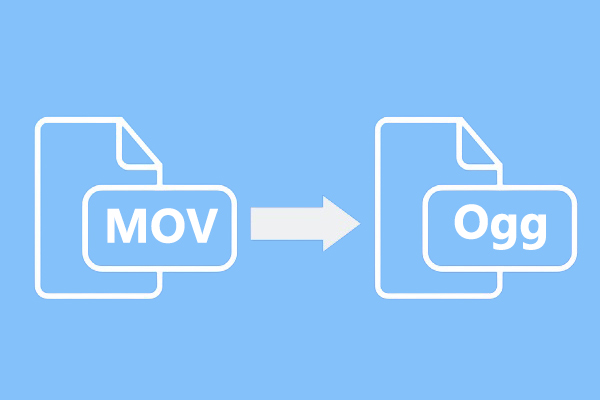
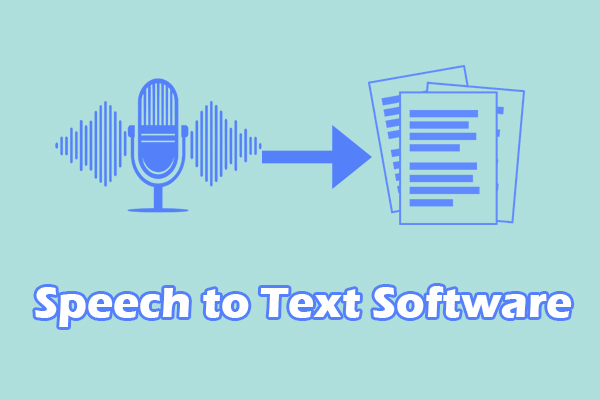
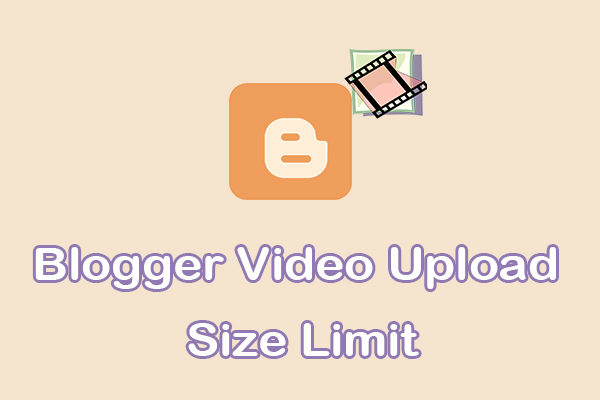
User Comments :